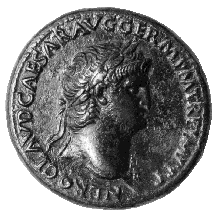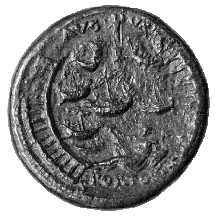



(78) Nero - AE sestertius, A.D. 64-66, 26.40 g. (inv. 91.141).
Obverse: Laureate bust of Nero r.; NERO CLAVD(IVS) CAESAR AVG(VSTVS) GERM(ANICVS)
P(ONTIFEX) M(AXIMVS) TR(IBVNICIA) P(OTESTATE) IMP(ERATOR) P(ATER) P(ATRIAE):
Nero Claudius Caesar Augustus Germanicus, pontifex maximus, with
tribunician power, imperator, father of the country.
Reverse: Bird's-eye view of the port of Ostia. At top, lighthouse surmounted
by statue of Neptune l., holding scepter; at bottom, reclining figure of
Tiber l., holding rudder in r. and dolphin in l.; to l., crescent-shaped
pier with portico; to r., crescent-shaped row of slips; in center, seven
ships; PORT(VS) OST(IENSIS) AVGVSTI: the port of Augustus of Ostia; S(ENATVS)-C(ONSVLTO):
by decree of the Senate.
Provenance: Coin Galleries, 1959.
Bibliography: C.H.V. Sutherland, The Roman Imperial Coinage I: from 31
BC to AD 69, rev. ed. (London 1984) 180.
One consequence of the emperor Nero's monetary reform of c. A.D. 64 (see
no. 74) was the reintroduction of the bronze sestertius, which had been
suspended since the time of the emperor Claudius. These large coins provided
Nero's die-engravers with opportunities to develop not only fine portraits
for the obverses but also very detailed reverses designed to remind people
of the emperor's good qualities and the services he provided to the people
of Rome.
The reverse of this sestertius commemorates the expansion of the Roman port
of Ostia. The work was begun by Claudius in A.D. 42, in order to provide
year-round deliveries of grain. The harbor was dedicated in A.D. 54, but
ten years later Nero made it part of an ambitious plan to connect Lake Avernus
to Ostia with a 125-mile long canal, a project never completed. The port
itself is depicted with a wealth of detail, not all of which is legible
on this coin. The porticoes of the pier on the left probably represent the
warehouses and offices through which the city's imported grain supply passed.
The slips on the right may represent the docking area. In the harbor large
and small ships come and go under the watchful eyes of the statue of Neptune,
god of the sea, and a personification of the river Tiber.
S.G.B.



All contents copyright (c) 1996.
Lawrence University
All rights reserved.